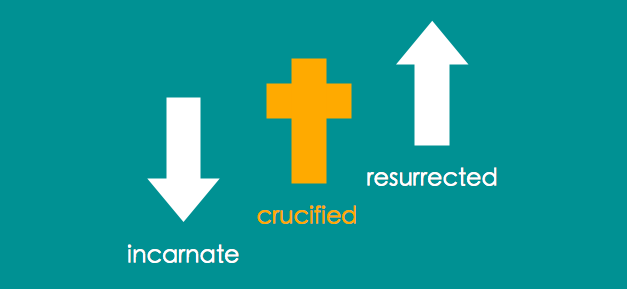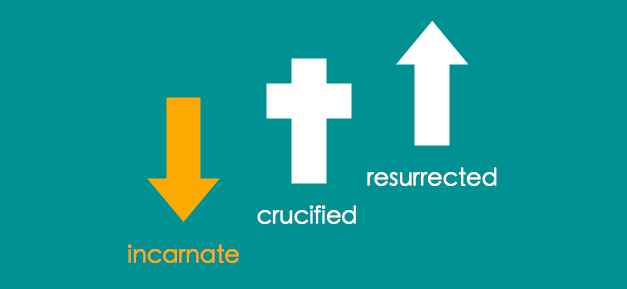I think it’s about time for another in the ‘Christlike’ series. So far, I’ve suggested being Christlike is more to do with embodying the overarching story of Jesus’ (life, death, resurrection) than to do with copying his actions, and I’ve explored what being incarnate might mean.
“Come Die with Me”
In Mark 8, having been identified as messiah, Jesus tells His disciples what that means – death and rising again. Awkward. Peter challenges Him, and receives some very strong words form Jesus: “Get behind me Satan!” (v33). The cross was so central to the purposes of God that any diversion from it is rightly seen as part of Satan’s plan to thwart God’s plans. The cross is crucial.
But Jesus makes plain to His disciples straight away that the cross is not just to be central in His life, but theirs too. He tells them, in some of the most challenging words of the Bible:
“Whoever wants to be my disciple must deny themselves and take up their cross and follow me. For whoever wants to save their life will lose it, but whoever loses their life for me and for the gospel will save it.” (Mark 8:34-35)
If I am to follow Jesus, I too must pick up a cross. In our day, this phrase is stripped of it’s meaning to become a mere inconvenience (“My neighbours are so inconsiderate, but we all have our cross to bear”). This drastically misunderstands Jesus’ words.
The only reason to pick up a cross is to die on it.
In calling us to be cross-bearers, Jesus calls us not to inconvenience, but to give our lives, to die. His call to us is ‘Come die with me’. I do not believe this necessarily to be physical death – though God may call us to that – but something far deeper.
The Essence of being Crucified
If we in our own small ways are to embody what Jesus did in huge ways, we must ask what Jesus’ death achieved and seek to apply that to ourselves. I see two main ways in which this works.
The first concerns sin. Ultimately, the cross is God’s victory over sin. Into a world bent on rebellion and sin, God – compelled by love that I will never understand – sent His Son to bear the weight of that sin at Calvary. Through Jesus’ atoning death, the bonds of sin were broken, and humanity no longer needs to serve their sinful natures. Paul describes this well:
“For we know that our old self was crucified with him so that the body ruled by sin might be done away with, that we should no longer be slaves to sin—because anyone who has died has been set free from sin.” (Romans 5:6-7
If Jesus’ crucifixion led to the conquering of sin, then for us to be crucified means no longer serving sin. Where the constant refrain of God in the Old Testament to Israel was ‘Be holy as I am holy’ (Lev 11:45), the essence of the New Testament teaching on holiness is: ‘you are already holy, so act like it!’
If we embody the crucifixion of Jesus in our lives, we will strive to shun all sin.
The second element of Jesus’ crucifixion and ours, is to do with worldviews and how we think. Jesus achieved a victory on the cross – by dying. That’s not normal. We see death as a defeat or an ending, not a victory or beginning. It’s why Peter couldn’t stomach Jesus’ plans – it didn’t compute. In our (sinful) nature, we would rather follow a mighty military leader than the crucified messiah.
But a crucified messiah we follow nonetheless! Again some words from Paul will be useful:
“For the message of the cross is foolishness to those who are perishing, but to us who are being saved it is the power of God … For the foolishness of God is wiser than human wisdom, and the weakness of God is stronger than human strength.” (1 Corinthians 1:18, 25)
The cross is scandalous. It throws ideas of power and victory on their head. It is a world gone topsy-turvy. Or, more accurately, it is the truth of how things should be, and what the world continues to accept is topsy-turvy. Through the cross, Jesus demonstrated that God doesn’t function how the world does. So in calling us to ‘Come die with me’, Jesus asks us to die to all the ways the world thinks, and to all the false ideas and conceptions the world has.
If we embody the crucifixion of Jesus in our lives, we will have a radically different picture of the world, of right and wrong, of everything.
What might that look like?
- Being meticulous about rooting out all sources of sin in our lives.
- Accepting God’s views on what is sin and what is not.
- Not settling because we sin only in ways that ‘aren’t so bad’, but striving for holiness in every aspect of our lives.
- Regular confession, both private and corporate. And repentance with it.
- Evaluation of all we’re told and all the ways we think through the lens of the cross, not through the lens of our own lenses.
- A rejection of human ideas of power and empire.
- A willingness to be spurned and ill-treated in service of others.
- A desire to stand with those who are suffering, and an ardent determination not to be the cause of others’ suffering.








